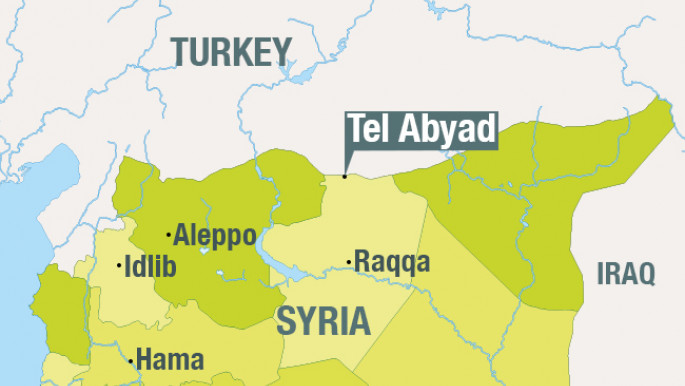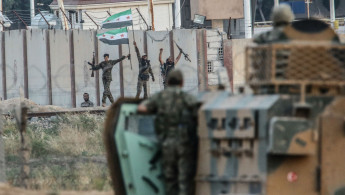Kurds seize Syria's Tal Abyad from Islamic State group
Kurdish fighters and Syrian rebels are understood to have taken control of the strategically important frontier town on Tuesday.
3 min read
Tal Abyad has been seized by Kurdish and Syrian rebel fighters [Anadolu]
The Syrian border town of Tal Abyad is now believed to be under full Kurdish control.
Kurdish People's Protection Units (YPG) fighters and Syrian rebels siezed the last parts of Tal Abyad from the Islamic State group (IS, formerly known as Isis) early on Tuesday morning.
"Since dawn this morning, not a single bullet has been fired in Tal Abyad," said Rami Abdel Rahman, director of the UK-based Syrian Observatory for Human Rights.
Swift victory
Kurdish fighters and Syrian rebels launched a two-pronged attack on Tal Abyad on 11 June, backed by coalition air strikes.
The town was attacked by anti-IS forces from the southwest, before the northern border crossing was captured on Monday.
From the Turkish side of the border, AFP journalists say that the black standard of IS was being replaced by the yellow banners of the YPG and the black-white-green flags of Syrian rebel groups.
Ahmed Seyxo, spokesperson for the Democratic Union Party, said, "IS withdrew without much of a fight yesterday... it was an easy win."
The anti-IS force is now combing the town for booby traps and landmines left behind by the extremist group.
"There are mines and car bombs everywhere, and bodies of IS fighters lying in the streets," said Sherfan Darwish, a spokesperson from the rebel group Euphrates Volcano.
Reports yesterday suggested that at least 40 IS fighters were killed in the Kurdish-rebel assault, while the survivors from the group fled to the nearby town of Ein Issa.
Tal Abyad is an important strategic town, and a gateway between Turkey in the north and the de facto "capital" of IS-held territory, Raqqa.
The town has also been an important logistics hub for the group, allowing them to smuggle out black-market oil into Turkey, and a transit point for foreign fighters and ammunition.
Blow for IS
IS will now have to rely on border crossings in Aleppo province, adding some 200 miles to their supply lines, Rahman said.
Analysts say that the fall of the town will be a major blow to IS, and has been decribed by Rahman as "the biggest setback to IS since it announced its caliphate one year ago".
The fall of the town comes as IS prepares to celebrate the one year anniversary of their self-declared caliphate.
After a string of recent military victories for IS, including the capture of Palmyra, this defeat, and others in Qalamoun and Aleppo, is likely to tarnish the image of the group as an invincible fighting force.
The UN refugee agency, UNHCR, reported that some 23,000 people had fled from Syria to Turkey between 3 and 15 June alone. Much of this was related to the fighting in Tal Abyad.
William Spindler, spokesperson for the UNHCR, reported that 70 percent of those who fled were woman and children.
"Most of the new arrivals are Syrians escaping fighting by rival military forces in and around the key border town of Tal Abyad," he told AFP.
"UNHCR staff say most refugees are exhausted and tired and arrive carrying just a few belongings. Some have walked for days."
The Kurdish-rebel alliance said they would allow the inhabitants to return to Tal Abyad once the town had been cleared of concealed bombs.
Kurdish People's Protection Units (YPG) fighters and Syrian rebels siezed the last parts of Tal Abyad from the Islamic State group (IS, formerly known as Isis) early on Tuesday morning.
"Since dawn this morning, not a single bullet has been fired in Tal Abyad," said Rami Abdel Rahman, director of the UK-based Syrian Observatory for Human Rights.
Swift victory
Kurdish fighters and Syrian rebels launched a two-pronged attack on Tal Abyad on 11 June, backed by coalition air strikes.
The town was attacked by anti-IS forces from the southwest, before the northern border crossing was captured on Monday.
From the Turkish side of the border, AFP journalists say that the black standard of IS was being replaced by the yellow banners of the YPG and the black-white-green flags of Syrian rebel groups.
| IS withdrew without much of a fight yesterday... it was an easy win. - Ahmed Seyxo, Democratic Union Party |
Ahmed Seyxo, spokesperson for the Democratic Union Party, said, "IS withdrew without much of a fight yesterday... it was an easy win."
The anti-IS force is now combing the town for booby traps and landmines left behind by the extremist group.
"There are mines and car bombs everywhere, and bodies of IS fighters lying in the streets," said Sherfan Darwish, a spokesperson from the rebel group Euphrates Volcano.
Reports yesterday suggested that at least 40 IS fighters were killed in the Kurdish-rebel assault, while the survivors from the group fled to the nearby town of Ein Issa.
Tal Abyad is an important strategic town, and a gateway between Turkey in the north and the de facto "capital" of IS-held territory, Raqqa.
The town has also been an important logistics hub for the group, allowing them to smuggle out black-market oil into Turkey, and a transit point for foreign fighters and ammunition.
 |
|
Blow for IS
IS will now have to rely on border crossings in Aleppo province, adding some 200 miles to their supply lines, Rahman said.
Analysts say that the fall of the town will be a major blow to IS, and has been decribed by Rahman as "the biggest setback to IS since it announced its caliphate one year ago".
The fall of the town comes as IS prepares to celebrate the one year anniversary of their self-declared caliphate.
After a string of recent military victories for IS, including the capture of Palmyra, this defeat, and others in Qalamoun and Aleppo, is likely to tarnish the image of the group as an invincible fighting force.
The UN refugee agency, UNHCR, reported that some 23,000 people had fled from Syria to Turkey between 3 and 15 June alone. Much of this was related to the fighting in Tal Abyad.
William Spindler, spokesperson for the UNHCR, reported that 70 percent of those who fled were woman and children.
"Most of the new arrivals are Syrians escaping fighting by rival military forces in and around the key border town of Tal Abyad," he told AFP.
"UNHCR staff say most refugees are exhausted and tired and arrive carrying just a few belongings. Some have walked for days."
The Kurdish-rebel alliance said they would allow the inhabitants to return to Tal Abyad once the town had been cleared of concealed bombs.





 Follow the Middle East's top stories in English at The New Arab on Google News
Follow the Middle East's top stories in English at The New Arab on Google News
![Israeli forces ordered bombed Gaza's Jabalia, ordering residents to leave [Getty]](/sites/default/files/styles/image_330x185/public/2176418030.jpeg?h=a5f2f23a&itok=_YGZaP1z)

